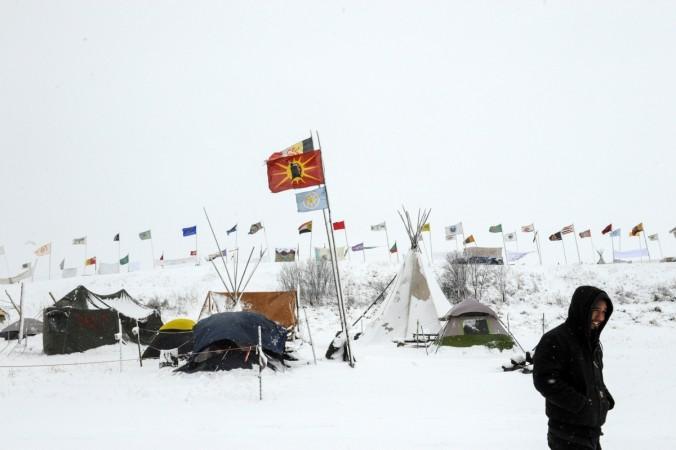
The Standing Rock Sioux tribe in North Dakota are holding their ground and refused the federal government's calls to evacuate the camp by December 5. The Army Corps of Engineers told the protesters that they must vacate the property near the Cannonball River in North Dakota or face arrest.
"This decision is necessary to protect the general public from the violent confrontation between protesters and law enforcement officials that have occurred in this area, and to prevent death, illness, or serious injury to inhabitants of encampments due to the harsh North Dakota winter conditions," Col. John Henderson of the Corps said in a letter to the Standing Rock Sioux Tribe leader.
However, on Sunday, the Army Corps of Engineers issued another statement that there will be no "forcible removal."
Whoever chooses to stay "do so at their own risk as emergency, fire, medical, and law enforcement response cannot be adequately provided in these areas," the statement added. "Those who remain will be considered unauthorised and may be subject to citation under federal, state or local laws."
The recent statement was the federal government washing its hands off responsibility in the matter. For the hundred protesters gathered and more coming in, the harsh North Dakota winters could act as a natural deterrent since they have said that no essential services can be guaranteed in the area.
The Corps "is basically kicking the can down the road, and all it is doing is taking the liability from the Corps and putting it on" the Standing Rock Sioux tribe, Morton County Sheriff Kyle Kirchmeier was quoted as saying by CTV News.
"When you put out a pronouncement that people must leave your land by a certain date, I think you take on a responsibility to somehow bring that about," Gov. Jack Dalrymple said. "Clearly the responsibility of clearing that land now lies primarily with the Corps." He called the Corps's position "very puzzling."
The Governor also issued a "mandatory evacuation" statement, but just the like Corps added that nobody will be forcibly removed.
With no essential services, the protesters will be forced to fend for themselves in the region, which could lead to them to evacuating the area on their own free will or braving the winters, risking their health.
The tribe has said that they "expect a win." "We are in for the long haul," said Chase Iron Eyes, a member of the Standing Rock Sioux Tribe.
If the tribe is prepared, which they are likely to be since the area falls under property reserved for the tribe, they will weather the winters. However, other protesters such as Whites, who have been treating the protest like a "Burning Man festival" are more likely to flee the ground.
On December 4, 2,000 veterans will be joining the water protectors' protest and a GoFundMe has raised half a million dollars for them to travel to the area.
"Everyday becomes more evident that the defenders of America must stand with the Water Protectors," Wesley Clark, who started the GoFundMe, wrote on the fundraising page. "Let's stop this savage injustice being committed right here at home. If not us, who? If not now, when? Are you a hero? Are you honourable? Not if you allow this the be the United States."
Also, joining the protest will be Tulsi Gabbard, the Democratic representative from Hawaii.
"Next weekend, the congresswoman will be joining thousands of veterans from across the country to stand in solidarity with the Standing Rock Sioux in North Dakota who are protesting the construction of the Dakota Access Pipeline through their tribal lands, with grave concerns about the contamination of their major water source," Gabbard's Press Secretary Emily Latimer confirmed in an email to the Observer.
With Gabbard joining the protest on December 4, it is highly likely that evacuations from the area will be minimal.















